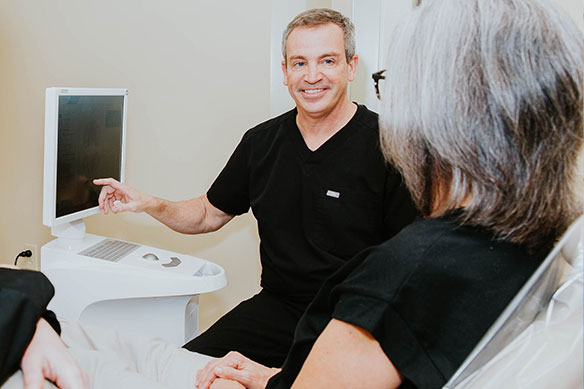DENTAL SERVICES
MISCELLANEOUS SERVICES


 How to Tell if You Have TMJ
How to Tell if You Have TMJIf you have Temporomandibular Joint (TMJ) Syndrome, you are likely experiencing jaw popping and/or jaw clicking, face and head pain, temporary jaw "locking," and difficulty biting, as well as jaw stiffness, earaches, and even tinnitus.
TMJ Syndrome refers to acute or chronic pain in the jaw muscles used for chewing and/or the temporomandibular joint. The temporomandibular joint connects your lower jaw to the main part of the skull. You have a TMJ on either side of your jaw, and each has two joints, which allow rotational and side-to-side movement.
Many TMJ cases are temporary if you rest and relax your jaw, giving it time to heal. However, if you're experiencing difficulty biting, chewing discomfort, jaw popping, or jaw and ear pain for more than a few weeks, you may need to seek other treatments.
TMJ disorder is usually caused by jaw trauma, repetitive jaw muscles clenching, or grinding teeth. Sometimes, it is caused by an uneven "bite" — your teeth are not lining up correctly when you close your mouth or chew. Dr. Welch will check to ensure that any tooth bridges, dental implants, or tooth overlays are intact and appropriately placed. If you've had a mouth trauma, he'll check your bite to be sure the injury didn't significantly displace any teeth, affecting your mouth's alignment. If Dr. Welch discovers any problems during this checkup, he'll explain your treatment options. Ideally, fixing the tooth-related issues will resolve your ongoing TMJ-related pain.
Suppose there are no apparent structural jaw concerns. In that case, Dr. Welch may recommend a specially molded mouthguard to help prevent you from grinding your teeth at night (often a cause of TMJ), conservative management with physical therapy, or in the worst cases, dental surgery to get rid of your painful TMJ symptoms.

If you have any questions, or would like to make an appointment, call our professional dental team at (336) 288-4499.